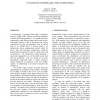Free Online Productivity Tools
i2Speak
i2Symbol
i2OCR
iTex2Img
iWeb2Print
iWeb2Shot
i2Type
iPdf2Split
iPdf2Merge
i2Bopomofo
i2Arabic
i2Style
i2Image
i2PDF
iLatex2Rtf
Sci2ools
138
Voted
WSC
1997
1997
Covalidation of Dissimilarly Structured Models
A methodology is presented which allows comparison between models under different modeling paradigms. Consider the following situation: Two models have been constructed to study different aspects of the same system. One model simulates a fleet of aircraft moving a given combination of cargo and passengers from an onload point to an offload point. A second model is an optimization (linear programming) model, which for given cargo and passenger requirements, optimizes aircraft and route selection in order to minimize late- and non-deliveries. The optimization model represents a much more aggregated view of the airlift system than does the simulation. The two models do not have immediately comparable input or output structures, which complicates a comparison of the two models’ outputs. A methodology is developed to structure this comparison. Two models which compare favorably using this methodology are considered covalid models. We define the covalidity of models in the narrow sense as...
Related Content
| Added | 01 Nov 2010 |
| Updated | 01 Nov 2010 |
| Type | Conference |
| Year | 1997 |
| Where | WSC |
| Authors | Samuel A. Wright, Kenneth W. Bauer Jr. |
Comments (0)

